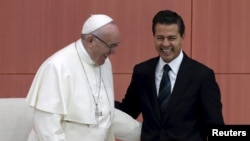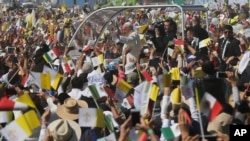Thousands cheered and gave a warm welcome to Pope Francis when he stepped out his plane Friday night in Mexico City.
This is Francis' first official visit to the heavily Catholic country. He was greeted by President Enrique Peña Nieto, first lady Angélica Rivera, traditional dancers, and a large crowd of admirers waving flashlights in time to the music from a band.
Pope Francis arrived in Mexico hours after he and the head of the Russian Orthodox Church signed a joint declaration for religious unity.
Their historic meeting was aimed at healing the 1,000-year-old rift between the Western and Eastern branches of Christianity.
Francis, the head of the Roman Catholic Church, and Patriarch Kirill embraced and kissed each other three times on the cheek as they began a two-hour meeting at Jose Marti International Airport in Havana.
"We hope our meeting contributes to the re-establishment of this unity wished for by God," the declaration says.
Kirill is on an official visit to Cuba and Francis made a brief stop in Havana on his way to Mexico.
Great Schism
The two branches of Christianity split in the Great Schism of 1054 over differences on theology and papal authority. The Russian Church also has accused Catholics of trying to convert followers in former Soviet states and satellites.
But church officials say the persecution of Christians — Catholic and Orthodox — in the Middle East and Africa has helped bring the two branches together.
Vatican spokesman Federico Lombardi said last week the meeting has "extraordinary importance in the path of ecumenical relations and the dialogue among Christian confessions."
He said Cuba was chosen for the meeting because "it is certainly a crossroad in the world of today."
In November 2014, Francis had said he told Kirill, "I will go wherever you want. You call me and I will go."
Most influential
Other popes have met with Istanbul-based ecumenical patriarchs of the Eastern Orthodox Church, but not the head of the Moscow Patriarchate, the most influential of the worldwide Orthodox churches.
The pope is head of the world's estimated 1 billion Catholics. Russia's Orthodox Church has 165 million of the world's 250 million Orthodox Christians.
In Photos: Mexico Prepares for Papal Visit












